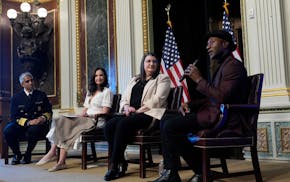The Crusades, when Christians tried for two centuries to oust Muslims from the Holy Land, left more than a million dead, with territory lost and gained and lost again -- all in the name of Jesus.
These days, Christians are not so quick to call the Crusades the golden age of Christendom, but a millennium later, their memory still reverberates.
Even so, Rodney Stark, 75, a professor of social sciences at Baylor University, says the crusaders were not all that bad, and certainly not barbaric, greedy warmongers.
In his new book "God's Battalions: The Case for the Crusades," the 1996 nominee for the Pulitzer Prize depicts soldiers who truly believed their military service under God would cover over a multitude of sins -- namely all that murdering and marauding required of them in the tumultuous Middle Ages.
"I get tired of people apologizing for the Crusades, like Christians were a bunch of dirty looters that went over there and killed everybody," Stark said. "It just wasn't true."
Of course, apologies on the subject have been many. Pope John Paul II expressed regret for the medieval violence in 2000, the same year Wheaton College changed its nickname from the Crusaders to the Thunder.
Stark argues that Muslims asked for it, that the Crusades were the first military response to Muslim terrorists and their looming, advancing Islamic empire. "It wasn't like they were harmless, little people minding their own business and tending their sheep," he said.
Indeed, Islamic powers were mighty before the Crusades and bounced back after Christian attempts at conquest ultimately failed.
"I suspect that Muslims will hate the book, and I'm sorry about that," Stark said. "That's just the way the world is."
Stark balks at the theory that the Crusades were spurred on by the promise of wealth and land. The Crusades were expensive, he argues, and far from being a profitable, colonial enterprise, they made paupers of princes.
Despite noble intentions, the crusading onslaught recalls atrocities like the Holocaust for Jews, said Talal Eid, founder of the Islamic Institute of Boston and commissioner on the U.S. Commission on International Religious Freedom. "The term crusade marks a painful time in the history of my kind, a painful era," he said.
Stark knows his book will have its critics, including his academic colleagues. But he does not worry about how his sympathetic portrayal of crusaders will be handled.
"If you sit there and worry about people misusing your stuff, you're never going to have anything to say," he said.

Photographer alleges he was forced to watch Megan Thee Stallion have sex and was unfairly fired
Phish fans are famously dedicated. What happens when they enter the Sphere?
Minneapolis will bid to host Sundance Film Festival

Icehouse on Eat Street in Mpls. facing eviction for unpaid rent
